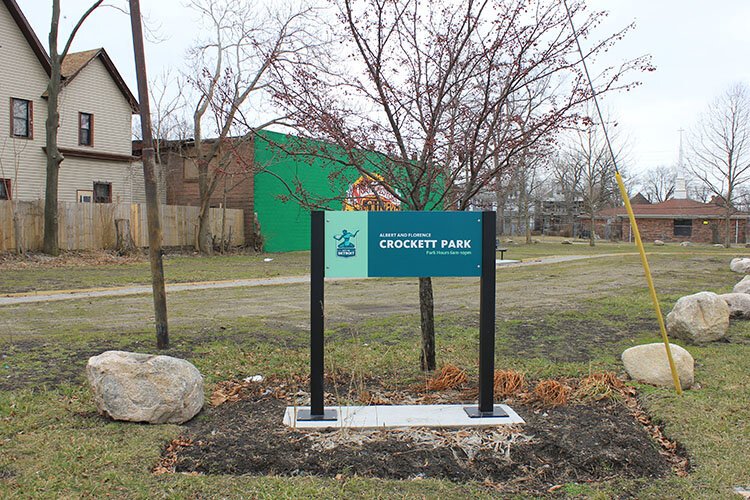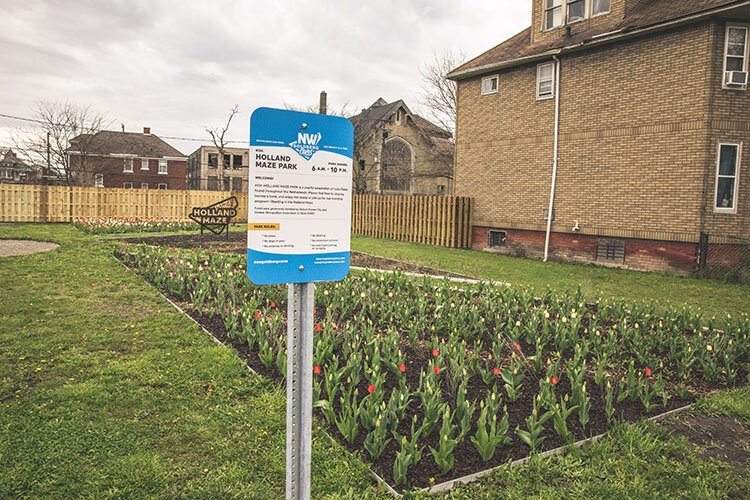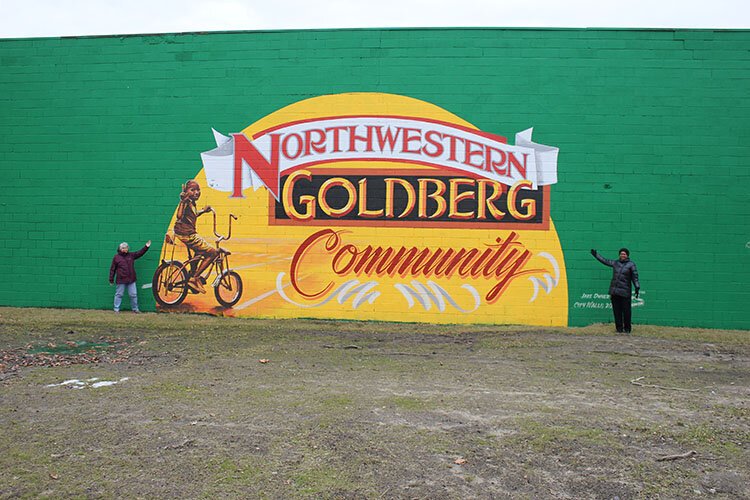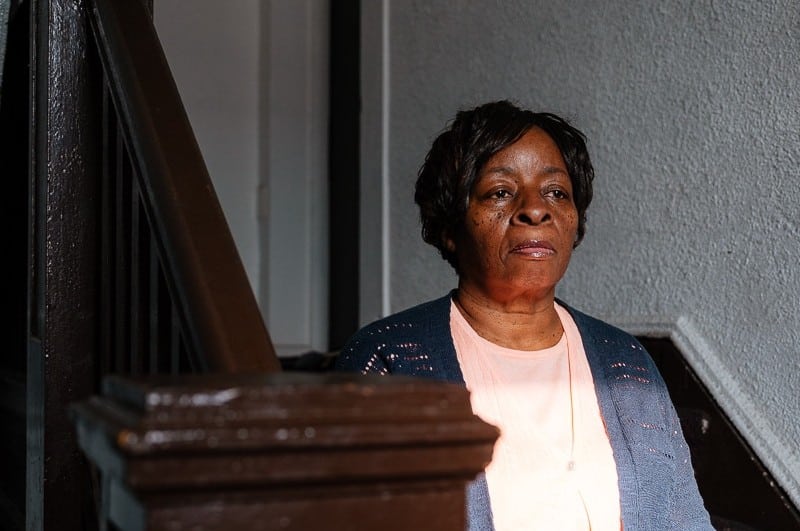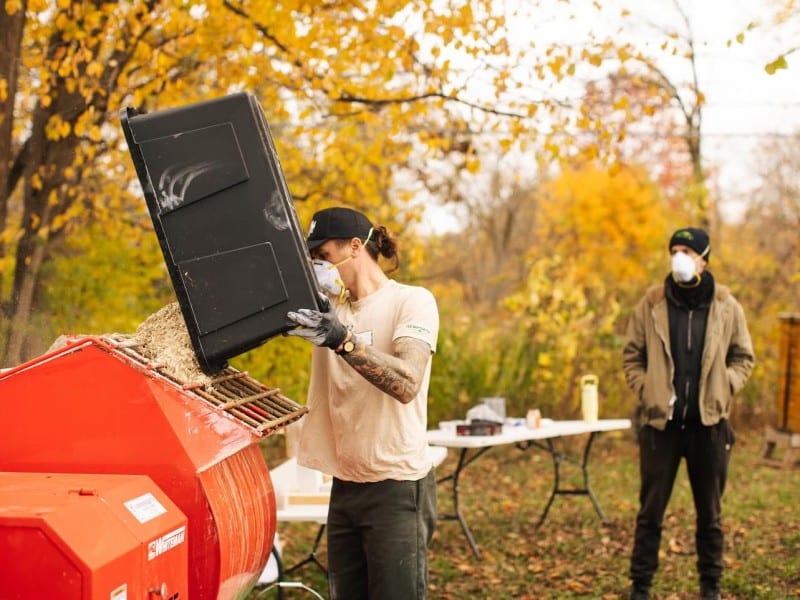How residents and businesses are building community through parks
Community groups and businesses say open and accessible outdoor space is important for all residents, and they are creating new spaces for the neighborhood, from art parks, to municipal parks, to safe spaces to wait for buses.
On a cold and gray winter afternoon, Cherrie Seay and Chris Evans survey Crockett Park and beam with pride at the mural proclaiming, “Northwestern Goldberg Community,” that their block club helped bring to their neighborhood last year.
Seay is a lifelong neighborhood resident and a member, along with Evans, of the 15th Street Block Club. At the corner of 14th Street and Marquette, Crockett Park was once a bustling park with a playground and was the center of her neighborhood life as a child.
“We’d walk through here or play here, and then we walked two blocks down to 12th [Street] and go to the elementary school,” Seay says.
Over the decades, it fell into disrepair, and the city eventually removed the playground equipment. The 15th Street Block Club adopted the park in 2011 to help restore it to its past glory. Last year, the block club obtained a grant from the League of Michigan Bicyclists to install bike racks and a bike repair station. The city installed the new bike equipment, benches, and a path running through the park. The city also arranged for the new mural.
Residents may disagree on the name of their neighborhood. But several groups and businesses agree that open and accessible outdoor space is important for all residents, and they are creating new spaces for the community, from art parks, to municipal parks, to safe spaces to wait for buses.
“What we need is places to gather and actually build a community, and the art park has shown that’s a very effective tool,” says Matthew Naimi, the founder of Lincoln Street Art Park. “It brings people together, using their hands and their heads and their ideas and found material to make something nice.”
If anything, the COVID-19 crisis has underscored the need for greater access to parks. “Detroit residents, and the African American community in particular, are suffering the impacts of this crisis most acutely,” says Garrett Dempsey of the Sierra Club and Detroit Outdoors. “Parks and open space are more essential now than ever for helping people cope, physically and mentally, with the uncertainty of this crisis.”
Accessibility to parks is important for communities’ well-being. A recent study from the Urban Institute defines “park equity” as “all residents having reasonably equal access to quality parks” and notes that low-income communities and communities of color historically have had barriers to park access. At the same time creating an empty green space that no one uses does not achieve park equity, the study says — instead, a park must provide programming or necessary services that the community uses.
The 15th Street Block Club cares for the park year-round. It also participates in community events, including programming for children, like the neighborhood trunk or treat. Seay and Evans want the neighborhood to be welcoming to children and eventually want to see playground equipment installed in Crockett Park again.
“We wanted to put something in this neighborhood that’s accessible to the children that live here,” Evans says.
Henry Ford Health System, the largest employer in NW Goldberg, aims to foster a strong relationship with the neighborhood and its employees to consider living there.
Over the next several years, the hospital plans to expand its campus in the neighborhood, beginning with the Brigitte Harris Cancer Pavilion opening this summer. Tom Habitz, urban planning specialist for Henry Ford Health System, says, “Before the entire area is built out with medical facilities, we want to beautify, activate, and create a measure of place within those spaces.”
Plans include a wildflower meadow and a plaza with benches and border elements made from limestone salvaged from a vacant church that was demolished during the cancer pavilion’s construction. The hospital also financially and programmatically supports community development corporation NW Goldberg Cares, founded in 2017 by Daniel A. Washington to help improve the quality of life for current residents while encouraging new residents who will respect the neighborhood’s history to move in.
Washington grew up in the neighborhood and has witnessed massive disinvestment and depopulation. An early initiative of NW Goldberg Cares is to establish quality parks on vacant land throughout the neighborhood. NW Goldberg Cares has created an art park and community garden and will be opening a rest and ride park at a 29 Linwood bus stop and a literacy park this year.
“Something that I am personally very excited about, and I know the organization is excited about as well, is the fact that we’ve made a conscious decision to ensure that the parks that we are building have programming to support it,” Director of Programming Jordan Yagiela says. “We want to make sure that we are providing these wraparound services that improve the quality of life for our neighbors.”
The 6102. ART PARK is designed more for adults and has benches where people can sit and read. It will also feature the “Neighborhood Stories” gallery this summer, which will display photos of five unique neighbors, their stories, and information about how the photographer found them.
The 6326. REST AND RIDE PARK will include a bus shelter in a corner park at Ferry Park Avenue and Linwood Street to provide a safe and dry place for residents who use public transit. The plans include a mural that will be installed inside the shelter. The design of the mural will include input from neighborhood residents.
“It is important for me to actually listen to my neighbors and listen to the residents and really hear them out and understand where they see their neighborhood progressing in the future,” Washington says. “It’s very important for us to know that the community not only supports it but see themselves in the mural and each of our parks.”
The 6134. HOLLAND MAZE LITERACY PARK focuses on children in pre-K through fifth grade. NW Goldberg Cares has planted more than 1,000 tulips donated by Bedrock in the park. The park was scheduled to host a summer reading program with notable Detroiters reading to children, but COVID-19 halted in-person programming. NW Goldberg Cares will host a virtual reading program instead with planned guests Rochelle Riley and Mary Sheffield.
The organization’s parks will be open for the public to use at its discretion, but it has canceled all events through the month of May.
When the governor’s directives indicate it is safe to do so, the literacy park will host celebrations of random holidays, such as national cookie dough day, and field trips for students from schools in Detroit and the metro area. Students will learn about the history of Detroit and the neighborhood.
Naimi, founder of Recycle Here, Green Living Science, and Make Art Work, established the Lincoln Street Art Park in 2011 in an area between his recycling center on Holden Street and Lincoln Street. People had been illegally dumping trash in the area for years, so Naimi gathered a band of volunteers and cleaned it up. He thought about fencing the area off to keep people from dumping more trash.
“Rather than a fence, we put up art and invited people in, and we had no idea, literally, what we were creating as far as the impact it would have on the city of Detroit and this neighborhood,” Naimi says.
Artists added murals and found-object sculptures. The community built a firepit, and the park hosted a Devil’s Night party that first fall.
“And then we stepped away from the project because it was October, and we wanted to see what would happen,” Naimi says. “When we did that, what we realized is people stopped dumping. People started adding art, rather than refuse. People started activating the park on their own.”
The Lincoln Street Art Park continues to host all-night parties. The park allows only female DJs to play its Full Moon parties to give them a needed space to showcase their talents. But do not look for the parties on social media, because they arise organically and by word of mouth. The park isn’t open for corporate events, and no sales are allowed on the grounds, because Naimi sees it as a space for the community to gather, not as a source of profit.
Make Art Work artist Ryan Doyle, who works in the same complex as Recycle Here and the Lincoln Street Art Park, has designed artwork for NW Goldberg Cares in several of its projects, including metal design and live-edge benches.
The park also hosts volunteer days for high school students and offers programming for elementary school children to learn about the “three Rs”: reduce, reuse, and recycle. The programming focuses on found material art and how to reuse items that are not recyclable.
The Lincoln Street Art Park is under construction and was scheduled to reopen later this spring or early summer before COVID-19 halted construction. Naimi says he is still in a wait-and-see mode, but construction should resume in the next few weeks. He says it is still too early to tell when the programs and parties will resume.
“The park will be a park, and the public will behave in accordance with all regulations that are in place for public spaces,” Naimi says. “As a free place of expression, we hope to keep the spirit and energy alive while being as safe as possible.”
Washington says the neighborhood has experienced so much disinvestment and depopulation over the years.
“There’s no way it exists for another 50, 60 years without people moving in and without new people being added to the fabric of the neighborhood,” he says. “And when we attract them, we want to help them understand that they will be added to an already established neighborhood.”
Evans, who was born in the neighborhood, moved back five years ago and appreciates the sense of community. She says, “We don’t always agree on everything, but an awful lot of times, when something’s going on, you get a lot of people to chip in. And that’s kind of gratifying.”
This article is part of our Equitable Development series, in partnership with Henry Ford Health System, where we explore neighborhood progress and impact of Henry Ford Health System and community partners. Stories illustrate growing an inclusive Detroit in a way that allows people from all races, classes, and abilities to participate and benefit.
